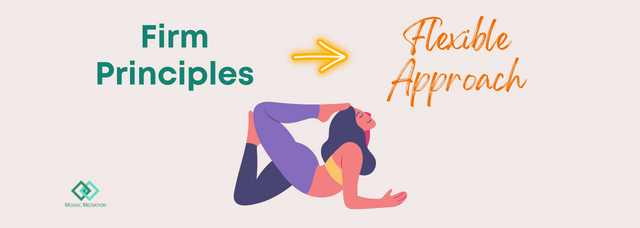Firm Principles, Flexible Approach
This is a subtitle for your new post

My parents would say to me and my siblings that they wanted to treat us all fairly and sometimes that would look like doing things differently to cater for each of our different personalities and needs.
Now, as a parent to two equally very different children, I can appreciate just how much that approach was helpful.
There are certain things that both my children need from us in equal measure for sure, but they also enjoy different types of activities and have some differences in how they connect with us and need support, accountability, and guidance. For example, my eldest enjoys getting me to do dance routines with her, my youngest prefers me playing on Roblox with her – it wouldn’t work so well if I tried to connect in the same way for both.
For me, this way of relating has firm principles but a flexible approach. I see this concept benefitting other types of relationships and situations too.
Considering someone’s well-being, standard principles are ensuring they feel heard, cared for and supported would be essential for anyone but how that is demonstrated would perhaps be different.
Considering someone’s education, standard principles are ensuring they are as equipped for life as possible and that they enjoy their education is probably what all people want from this stage in life, but they may need to access their education in different ways and will enjoy different aspects of it.
I feel like the same should be said for leaders too. I remember one mediation where the biggest complaint one individual (in a different team) had against another person was that they were “not a strong manager”. On digging into that comment, it became apparent that they had a very rigid idea of how a ‘strong manager’ behaved and managed their team – loud, driven, and authoritarian. The line manager’s approach, however, was calm, gentle, and a listening ear, which actually worked well for their team.
My thinking is that there are certain principles which benefit all managers' relationships with their team members – in terms of being a person they can trust to be capable, demonstrate integrity, have compassion, and communicate effectively. However, they will perhaps have a flexible approach to supporting different individuals in their team, to meet their unique needs, motivate them and provide direction.
There are probably a few reasons why people stick to a rigid approach:
· They have seen it work well before
· Low confidence or knowledge of a different approach
· Instructions from their senior leaders or fixed process
· Low self-confidence (in their ability to do something different or without a fixed process)
When I first completed my workplace mediation training over seven years ago, I knew that one of the principles of mediation was that it was a ‘flexible process’, however, I was nervous to stray from what I perceived to be the accepted structure and approach.
As my experience, confidence and skillset grew, so did my ‘toolkit’ - and, so did my discernment about which approach will likely work for each case.
What have I noticed?
By sticking to the principles of mediation (and my values as an individual) but having an approach that is flexible to the needs of the parties and the situation, the process flows and the outcomes make sense.
Here is how I now approach a situation with flexibility:
· If communication challenges are a key feature in the situation, then I include DISC profiling within the process.
· If there are a few different strands to the mediation and different people are involved in only some of those, then I provide multiple stages to the process.
· If someone has mental health concerns or needs a bit more prep time before the joint session, then I do extra conflict coaching sessions. And, if only one of the parties is having extra coaching, then I find an appropriate conflict coach from my pool of wonderful conflict resolution associates, to do that session so that it feels fair and neutral to all parties.
· If one party wants to mediate and the other doesn’t, it’s not the end of the road! I just coach the willing individual through what has happened and help them feel equipped and empowered for any future situations.
· If parties want to move past the issues but don’t want to converse directly, I don’t push that on them. I go between rooms (virtual or in-person) to facilitate communication.
· If further support is required after the mediation, I offer appropriate coaching, training or advisory support for as long as is required.
It works!
I continue to apply the same concept of having firm principles and a flexible approach to how I run my business, how I approach relationships, manage my boundaries, and where I invest my time and energy.
So, what are your non-negotiable, foundation principles? Knowing those, how does this enable you to have a flexible approach to the different areas in your life?
Emma Jenkings is an experienced mediator, conflict coach, DISC Practitioner and communication skills trainer. You can get in touch by emailing enquiries@mosaicmediation.co.uk or via the 'Contact' page.










